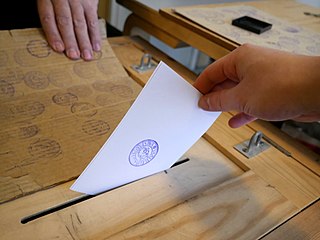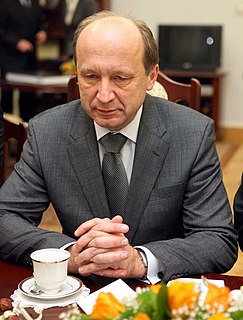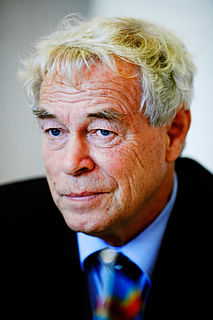The politics of Finland take place within the framework of a parliamentary representative democracy. Finland is a republic whose head of state is President Sauli Niinistö, who leads the nation's foreign policy and is the supreme commander of the Finnish Defence Forces. Finland's head of government is the Prime Minister, who leads the nation's executive branch, called the Finnish Government. Legislative power is vested in the Parliament of Finland, and the Government has limited rights to amend or extend legislation. Because the Constitution of Finland vests power to both the President and Government, the President has veto power over parliamentary decisions, although this power can be overruled by a majority vote in the Parliament.
The politics of Norway take place in the framework of a Parliamentary representative democratic constitutional monarchy. Executive power is exercised by the Council of State, the cabinet, led by the Prime Minister of Norway. Legislative power is vested in both the government and the legislature, the Storting, elected within a multi-party system. The judiciary is independent of the executive branch and the legislature.

The Storting is the supreme legislature of Norway, established in 1814 by the Constitution of Norway. It is located in Oslo. The unicameral parliament has 169 members, and is elected every four years based on party-list proportional representation in nineteen plurinominal constituencies. A member of the Storting is known in Norwegian as a stortingsrepresentant, literally "Storting representative".
The Swedish People's Party of Finland is a liberal-centrist political party in Finland aiming to represent the interests of the minority Swedish-speaking population of Finland. An ethnic catch-all party, the party's main election issue has been since its inception the Swedish-speaking Finns' right to their own language and to maintain the Swedish language's position in Finland. The party was in governmental position 1979–2015 with one or two seats in the government and collaborated with the centre-right as well as the centre-left in the Parliament of Finland. After the 2015 election SFP was left out of the government formed by the three biggest parties.

The Centre Party of Finland is a centrist, liberal, and agrarian political party in Finland.

There are four types of elections in Finland. Each Finnish citizen at least 18 years of age has the right to vote in each of the elections, which decide the following: the president, the parliament, the MEPs, and the municipal and city councils.

Viveka Eriksson or Viveca Eriksson is a politician on the autonomous Åland Islands and the former Premier of Åland from 2007 to 2011.

Roger Jansson is a politician in the Åland Islands, an autonomous and unilingually Swedish territory of Finland. He has studied in Åbo Akademi.

The Moderates of Åland was a conservative and liberal-conservative political party on the Åland Islands. At the 2003 elections, the party won 13.6% of popular votes and 4 out of 30 seats. The current party leader is Johan Ehn. In the 21 October 2007 parliamentary elections, the party won 9.5% of the popular vote and 3 out of 30 seats, a loss of one.

Parliamentary elections were held in Finland on 16 March 2003. The Centre Party led by Anneli Jäätteenmäki overtook the Social Democratic Party (SDP) to become the largest party in the Eduskunta. This was credited mainly to Jäätteenmäki's powerful leadership and modernization of the party still often viewed as agrarian and conservative by many. However, the SDP actually won some seats and increased its share of the vote, losing in the number of total popular votes only by a few thousand.
Åland held legislative elections on 19 October 2003. It elected the diet (Lagtinget), which has 30 members, elected for a four-year term by proportional representation. Though the Åland Centre recorded its worst results to date in the elections, it regained its status as the largest party on Åland, beating out the Liberals for Åland by a mere 10 votes. The Åland Social Democrats had one of its best election results ever, doubling its representation in the Lagting.
Åland held legislative elections on 17 October 1999. It elected the diet (Lagtinget), which has 30 members, elected for a four-year term by proportional representation. It was the first election contested by the Åland Centre in which it did not become the largest party, narrowly losing out to the Liberals for Åland.
Åland held legislative elections on 15 October 1995. It elected the diet (Lagtinget), which has 30 members, elected for a four-year term by proportional representation.
Åland held legislative elections on 20 October 1991. It elected the diet, which has 30 members, elected for a four-year term by proportional representation.
Åland held legislative elections on 18 October 1987. It elected the diet, which has 30 members, elected for a four-year term by proportional representation.

Parliamentary elections were held in Lithuania on 12 October 2008, with a second round on 26 October in the constituencies where no candidate won a majority in the first round of voting. All 141 seats in the Seimas were up for election; 71 in single-seat constituencies elected by majority vote and the remaining 70 in a nationwide constituency based on proportional representation. Together with the elections, a referendum on extending the operation of Ignalina Nuclear Power Plant was held.
The Åland Islands are governed according to the Act on the Autonomy of Åland and international treaties. These laws guarantee the islands' autonomy from Finland, which has ultimate sovereignty over them, as well as a demilitarized status. The Government of Åland, or Landskapsregering, answers to the Parliament of Åland, or Lagting, in accordance with the principles of parliamentarism.

General elections will be held in Sweden on 11 September 2022 to elect the 349 members of the Riksdag. They in turn will elect the Prime Minister of Sweden. regional and municipal elections will also be held on the same day.















